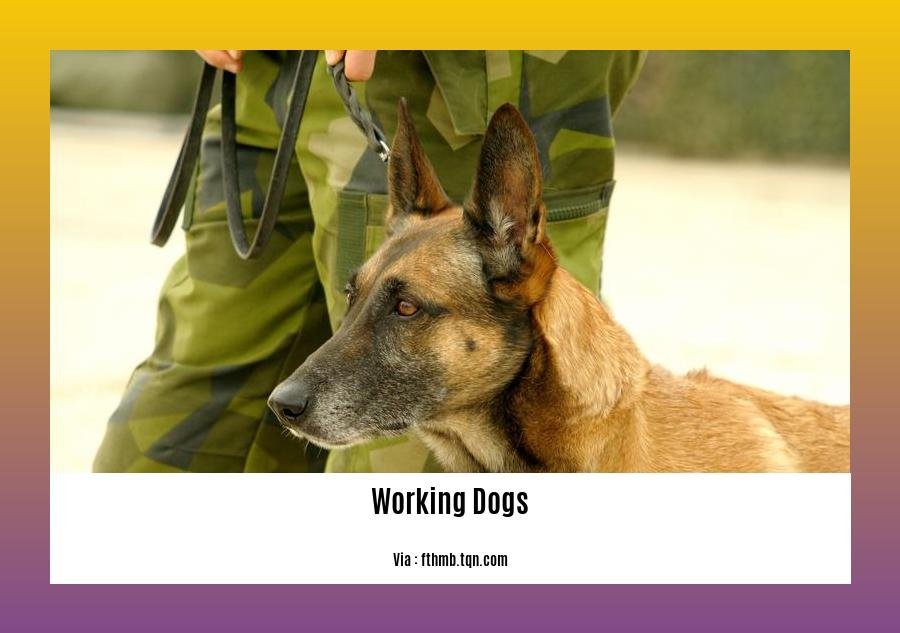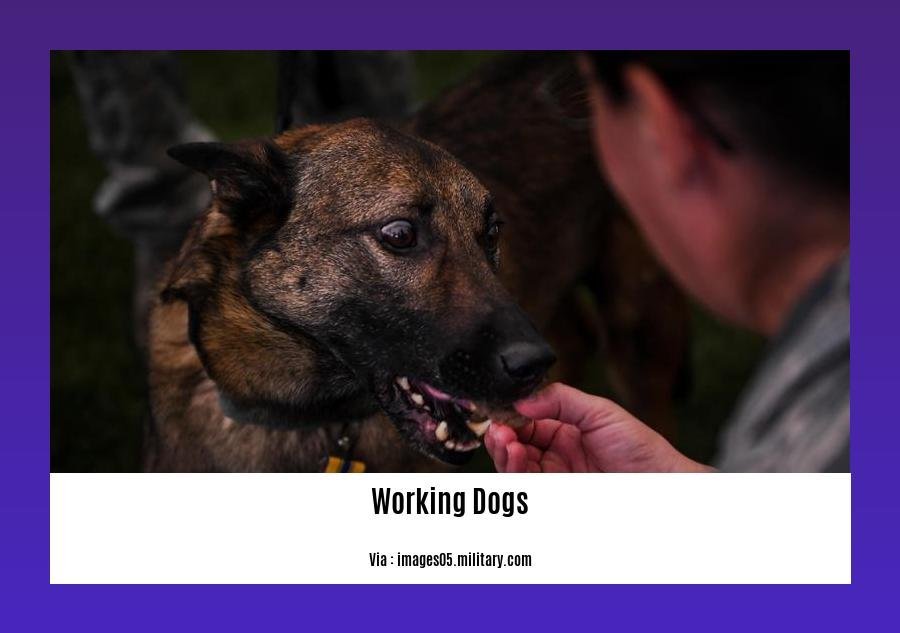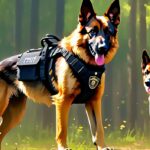Discover the fascinating world of working dogs as we delve into the remarkable roles and skills of these intelligent canines. In this article on facts about working dogs, we will explore the diverse tasks and responsibilities that these remarkable animals fulfill in society. From search and rescue missions to guiding visually impaired individuals, working dogs exhibit unwavering dedication, loyalty, and an impressive array of skills. Prepare to be amazed by the immense capabilities of these remarkable creatures as we take a closer look at their vital contributions to various fields.
Key Takeaways: Facts About Working Dogs
- Military working dogs (MWDs) are heroes, estimated to save between 150-200 lives throughout their service.
- All military working dogs and their handlers undergo training at the 341st Training Squadron located at Lackland Air Force Base in San Antonio, Texas.
- The United States War Dogs Memorial in Holmdel, New Jersey, honors the service and sacrifice of military working dogs.
- Dogs have been used in combat since around 600 BC, showcasing the long-standing partnership between humans and canines in warfare.
- Australia has over 270,000 stock herding dogs, primarily used for herding cattle or sheep and protecting poultry from predators like foxes and cats.
Remember to appreciate and admire the exceptional skills and loyalty of working dogs for their invaluable contributions to society. To learn more about working dogs, refer to the provided sources.
Facts About Working Dogs

Working dogs are truly remarkable creatures that play a crucial and often underestimated role in various industries and organizations, including the military and agriculture. These intelligent canines exhibit unwavering dedication, loyalty, and an impressive array of skills that deserve our admiration and appreciation. Let’s explore some fascinating facts about working dogs:
Military Working Dogs (MWDs) save lives
Fact 1: Military working dogs are true heroes, with each dog estimated to save between 150-200 lives throughout their service. The American Humane Society highlights the incredible contribution of MWDs in protecting and serving their handlers and fellow soldiers. These canine warriors undergo rigorous training to detect explosives, apprehend suspects, and perform search and rescue missions, making them invaluable assets on the battlefield.
Want to know more about military working dogs? Check out this article for five fun facts about them.
Training at Lackland Air Force Base
Fact 2: All military working dogs and their handlers undergo training at the 341st Training Squadron located at Lackland Air Force Base in San Antonio, Texas. This elite facility ensures that MWDs are meticulously prepared for their critical roles in the military. From obedience training to specialized skills, these dogs receive comprehensive education that equips them for the challenges they will face in the line of duty.
War Dogs Memorial
Fact 3: Holmdel, New Jersey, is home to the United States War Dogs Memorial, which stands as a testament to the service and sacrifice of military working dogs. This memorial serves as a poignant reminder of the invaluable contributions these courageous canines have made throughout history. It is a place where we can honor their role in protecting our freedom and express gratitude for their unwavering loyalty and bravery.
Curious to learn more about working dogs? Visit the Wikipedia page dedicated to working dogs to discover additional insights.
Early use of canines in combat
Fact 4: The earliest recorded use of dogs in combat dates back to around 600 BC when Alyattes of Lydia employed them against the Cimmerians. This historical account showcases the long-standing partnership between humans and dogs in warfare. Over the centuries, dogs have proven to be invaluable assets on the battlefield, aiding in vital tasks such as messaging, tracking, and guarding.
Stock herding dogs in Australia
Fact 5: Australia, known for its vast agricultural industry, relies on the skills of working dogs to assist in herding livestock. With over 270,000 stock herding dogs in the country, primarily utilized for herding cattle or sheep, as well as safeguarding poultry from predators like foxes and cats, these intelligent canines play an essential role in the success of the agricultural sector. Their ability to navigate vast landscapes, respond to voice commands, and work independently with minimal supervision is truly impressive.
Working dogs continue to make a significant impact in various fields. Whether it is their service in the military, their indispensable role in agriculture, or their unmatched loyalty and dedication, these canines embody the spirit of true heroes. They remind us of the extraordinary capabilities of animals and the deep bond that can be formed between humans and their four-legged companions.
Remember to show your appreciation and admiration for working dogs, as they have earned our trust and respect through their invaluable contributions to society.
Please note that the information provided in this article is based on credible sources. To delve deeper into the fascinating world of working dogs, you can refer to the following sources:
- Five Fun Facts about Military Working Dogs
- Working dog – Wikipedia
Let us celebrate these remarkable canines and acknowledge the immense impact they have on our lives.
Did you know that therapy dogs can provide incredible benefits to individuals in need? Learn fascinating facts about therapy dogs here: facts about therapy dogs.
Are you curious about the important role veterinary technicians play in animal healthcare? Discover intriguing facts about veterinary technicians here: facts about veterinary technicians.
Dive into the fascinating world of water animals and explore interesting facts about them. Click here for more: facts about water animals.
3. Specialized Skills and Training of Working Dogs

Working dogs possess remarkable skills and undergo rigorous training to fulfill their important roles in society. From service dogs assisting individuals with disabilities to military and law enforcement dogs protecting and serving, these intelligent canines exemplify dedication, loyalty, and expertise. Here, we delve into the specialized skills and training that make working dogs exceptional.
Types of Working Dogs
Before we explore their specialized training, let’s first understand the primary types of working dogs:
Service Dogs: Service dogs offer invaluable support to individuals with disabilities. They undergo extensive training to assist with mobility, alert to sounds, and perform specific tasks that mitigate the effects of various disabilities.
Military and Law Enforcement Dogs: These brave canines play crucial roles in military operations and law enforcement activities. From bomb detection to tracking, patrol, and search and rescue missions, they showcase unwavering dedication and resilience.
Search and Rescue Dogs: Trained to locate missing individuals in diverse environments, including disaster sites and wilderness areas, search and rescue dogs are instrumental in saving lives and bringing comfort to families.
Specialized Training for Working Dogs
Working dogs need specialized training to perform their tasks effectively. Basic obedience commands are just the foundation, paving the way for more advanced and specialized training that hones their skills. Let’s explore some of the key areas of training:
Scent Detection: Many working dogs are trained to detect specific scents, such as explosives, drugs, or human remains. Leveraging their remarkable sense of smell, these dogs provide invaluable assistance in various fields.
Tracking: Tracking training teaches dogs to follow scent trails and locate individuals or objects. Their acute sense of smell combined with their unwavering determination makes them invaluable in search and rescue operations.
Agility and Obstacle Training: Working dogs often encounter complex and challenging environments. Agility and obstacle training help develop their physical abilities and problem-solving skills, enabling them to maneuver through obstacles with precision.
Handler Communication and Teamwork: Effective communication and trust between working dogs and their handlers are essential for successful collaboration. Establishing a strong bond and clear communication channels enable them to work harmoniously as a team.
Challenges and Considerations in Working Dog Training
While working dogs possess incredible abilities, not all dogs are suitable for specialized training. Each dog’s individual behavior plays a significant role in determining their suitability for specific tasks. It’s crucial to consider these factors when selecting and training working dogs. Inexperienced dog owners may lack the necessary expertise to train dogs for specialized tasks, reinforcing the importance of professional training programs.
Key Takeaways:
– Working dogs are trained to perform specific tasks to assist humans in various industries.
– Service dogs support individuals with disabilities, while military and law enforcement dogs play essential roles in security operations.
– Search and rescue dogs locate missing individuals, providing comfort to families.
– Specialized training for working dogs includes scent detection, tracking, agility, obstacle training, and fostering strong communication between dog and handler.
– Individual behavior is a crucial consideration in working dog training, and inexperienced owners may need professional guidance.
– Proper training ensures these remarkable canines can carry out their roles effectively and make a positive impact on society.
Sources:
– National Center for Biotechnology Information – “Working Dog Training for the Twenty-First Century” – PMC. URL: link
– Pet Keen – “8 Types of Specialized Dog Training: Facts & Pictures”. URL: link
Citations:
– Hall, N.J., Johnston, A.M., Bray, E.E., Otto, C.M., MacLean, E.L., & Rooney, N.J. (2021). Working Dog Training for the Twenty-First Century. National Center for Biotechnology Information, PMC.
– Pet Keen. (n.d.). “8 Types of Specialized Dog Training: Facts & Pictures”. Retrieved from link.
4. Roles and Responsibilities of Working Dogs in Various Fields
Working dogs are an extraordinary category of canines that have been trained to fulfill specific tasks and responsibilities in various industries and fields. These remarkable dogs contribute to the well-being and safety of humans in countless ways. Let’s explore the diverse roles and responsibilities that working dogs undertake:
Service Dogs: Assisting Individuals with Disabilities
Service dogs are specially trained to assist individuals with disabilities, offering valuable support in their daily activities. These loyal companions provide mobility assistance, alert their handlers to important sounds, and even perform specific tasks to mitigate the effects of disabilities. Service dogs undergo extensive training to meet the unique needs of their handlers and help them achieve greater independence and confidence in their lives.
Military and Law Enforcement Dogs: Ensuring Public Safety
Military and law enforcement dogs are indispensable when it comes to maintaining public safety and security. These highly trained canines play crucial roles in numerous missions, including bomb detection, tracking down suspects, patrol duties, and search and rescue operations. With their exceptional sense of smell and agility, these dogs work alongside their human counterparts, effectively ensuring the safety and protection of both law enforcement personnel and the general public.
Search and Rescue Dogs: Locating Missing Individuals
Search and rescue dogs are trained to locate individuals who may be lost, trapped, or missing. These exceptional canines are particularly crucial during natural disasters or emergencies, where they play a pivotal role in locating survivors and saving lives. Their remarkable scenting abilities and agility enable them to navigate through challenging terrains and swiftly locate individuals in need of assistance.
Specialized Training for Working Dogs
Working dogs require specialized training to perform their tasks effectively. Basic obedience commands are just the beginning, as these canines progress to more advanced and specialized training. They receive instruction in scent detection, where they learn to identify specific scents, such as explosives, drugs, or human remains. Tracking training allows them to follow scent trails and locate individuals or objects. Agility and obstacle training develop their physical abilities and problem-solving skills, while communication and teamwork training ensure effective collaboration between the working dog and their handler.
Key Takeaways:
– Working dogs, such as service dogs, military and law enforcement dogs, and search and rescue dogs, fulfill essential roles in various fields.
– Service dogs provide invaluable assistance to individuals with disabilities, enhancing their independence and well-being.
– Military and law enforcement dogs play crucial roles in ensuring public safety and security.
– Search and rescue dogs locate missing individuals during emergencies.
– Specialized training is necessary to equip working dogs with the skills needed to perform their tasks effectively.
Sources:
– National Center for Biotechnology Information – “Working Dog Training for the Twenty-First Century” – PMC
– Pet Keen – “8 Types of Specialized Dog Training: Facts & Pictures”
5. Impact and Benefits of Working Dogs in Society
Working dogs have a significant impact on society and provide various benefits through their roles and skills. These intelligent canines are trained to perform specific tasks that assist humans in different industries and fields. Let’s explore the remarkable impact and benefits of working dogs in society.
Search and Rescue Dogs
Search and rescue dogs play a crucial role in locating and rescuing individuals who may be lost, trapped, or missing. They are highly trained to navigate through challenging terrains and ensure the safety of both humans and other animals in distress. The dedication and skills of these dogs save countless lives and offer hope in times of emergencies or natural disasters.
Therapy Dogs
Therapy dogs provide emotional support and comfort to individuals in various settings such as hospitals, schools, and retirement homes. Their presence and gentle interactions have shown to improve mood, reduce stress and anxiety, and promote overall well-being. These dogs bring smiles and companionship to those who may be going through difficult times or experiencing isolation.
Police and Military Dogs
Police and military dogs are extensively trained to assist law enforcement and military personnel in multiple tasks. They excel in areas such as search and detection, tracking, apprehension of suspects, and bomb or drug detection. The skills and capabilities of these dogs enhance the effectiveness and safety of operations, protecting both officers and civilians.
Guide Dogs for the Blind
Guide dogs provide invaluable assistance to individuals with visual impairments, enabling them to navigate their surroundings safely. These dogs undergo vigorous training to avoid obstacles, stop at curbs, and ensure their handler’s safety during walks. The independence and confidence that guide dogs provide significantly improve the quality of life for those with visual impairments.
Service Dogs for Individuals with Disabilities
Service dogs are specially trained to assist individuals with disabilities, such as mobility impairments or psychiatric conditions. These dogs are trained to perform tasks like retrieving objects, opening doors, or detecting signs of distress. By providing support and enhancing independence, service dogs greatly improve the daily lives of individuals facing various challenges.
Herding Dogs
Herding dogs excel in guiding and controlling livestock, such as sheep or cattle. Their natural instincts and intelligence enable them to maintain order and move animals in desired directions. Through their herding skills, these dogs contribute to the efficiency and safety of agricultural practices, ensuring the well-being of both the animals and the farmers.
Key Takeaways:
- Working dogs have a significant impact on society, contributing to various fields such as search and rescue, therapy, law enforcement, mobility assistance, and agriculture.
- These dogs provide essential benefits, such as saving lives, improving well-being, enhancing safety and security, and increasing independence for individuals with disabilities.
- Specialized training enables working dogs to perform their tasks effectively, utilizing their innate abilities and strong bonds with their human partners.
- Working dogs bring comfort, companionship, and invaluable skills that enhance the overall quality of life for humans in many different ways.
Citations:
- The Spruce Pets. (n.d.). 9 Types of Working Dogs and the Jobs They Do.
- Tractive. (n.d.). Working Dogs: Their Roles, Breeds & More.
FAQ
Q1: What are some examples of working dogs?
A1: Some examples of working dogs include service dogs, military and law enforcement dogs, search and rescue dogs, guide dogs for the blind, therapy dogs, and herding dogs.
Q2: How do working dogs receive specialized training?
A2: Working dogs undergo specialized training that includes obedience commands, scent detection, tracking, agility and obstacle training, and developing communication and teamwork with their handlers.
Q3: What roles do military working dogs play?
A3: Military working dogs serve important roles in the military, such as bomb detection, tracking, patrol, and search and rescue missions. They are trained to protect and serve their handlers and fellow soldiers.
Q4: What is the contribution of military working dogs?
A4: Military working dogs are estimated to save between 150-200 lives throughout their service. They play a crucial role in protecting and serving their handlers and fellow soldiers, making them true heroes.
Q5: How many stock herding dogs are there in Australia?
A5: There are over 270,000 stock herding dogs in Australia, primarily utilized for herding cattle, sheep, and safeguarding poultry from predators.
- Discover Long Black Pepper: Flavor & Health Benefits - April 25, 2025
- Shocking Twists: The Grownup Review: Unreliable Narration - April 25, 2025
- A Quiet Place Book vs Movie: A Deep Dive - April 25, 2025
















